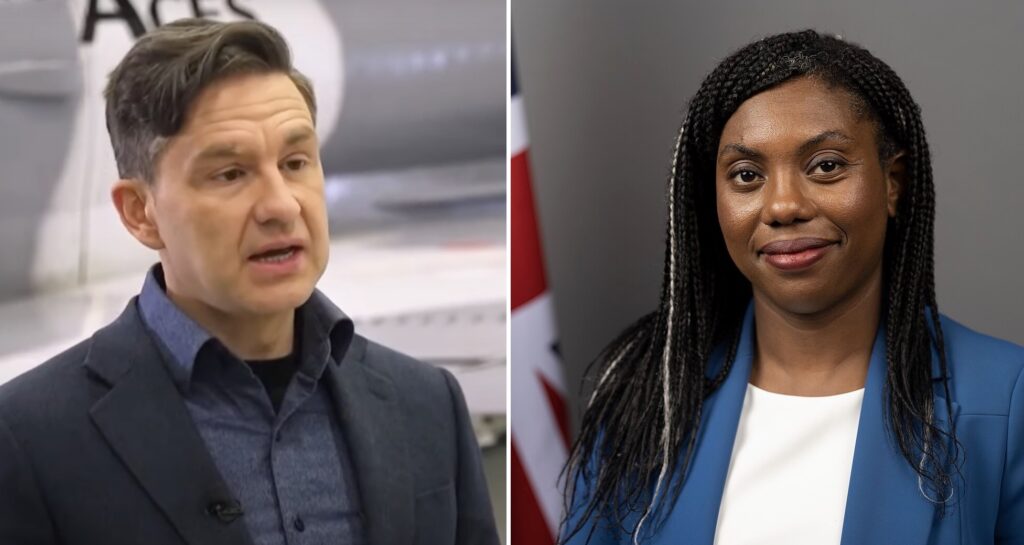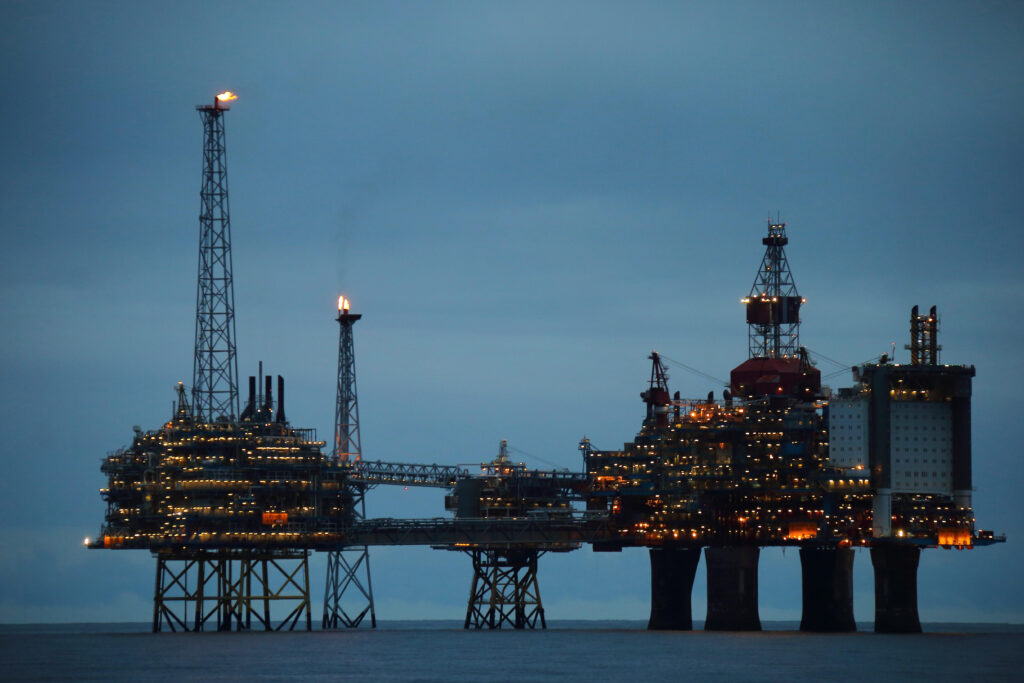The oil giant funds both civil rights groups and police, saying “Black Lives Matter” while committing acts of environmental racism all over the world.
By Amy Westervelt. This story originally appeared in the Hot Take newsletter.
At a House committee hearing on fossil fuel deception last year, Congressional reps from oil and gas states repeated a long-used talking point: A clean energy transition is just a big fuck-you to poor people. They claim that it risks leaving marginalized communities out in the cold and stalls development in Africa. (They love to talk about how dependent African economic growth is on fossil fuels, never about how they’ve destroyed water sources and wetlands and murdered protesters there). The grossest part: Fossil fuel companies also fund various civil rights groups to spread their message for them, all while simultaneously literally choking the life out of Black and brown communities with refineries and petrochemical plants.
It’s an underhanded trick that’s almost as old as the industry itself. In fact, some of the same PR firms that helped Big Oil come up with the strategy of framing a transition away from fossil fuels as racist helped Big Tobacco push the idea that a cigarette tax would disproportionately harm Black communities back in the 1990s. The tobacco guys even put money into the same civil rights groups to spread that message as the oil companies are funding today.
Earlier this year, civil rights groups the National Urban League and The Rainbow Push Coalition began campaigning for the oil and gas industry to diversify their hiring practices. Not a totally outlandish request, but it happens to dovetail with initiatives at most fossil fuel companies to market themselves as “diverse” and therefore good. Oil companies have never been ones to pass up an opportunity to co-opt one thing to hide another.
Chevron Black History Month tweet
On Monday, Axios reported that amidst the #BlackLivesMatter protests, these campaigns have “taken on new urgency.” There’s no evidence provided in the piece that the “new urgency” part is true for anyone but the oil companies that want to plug themselves into the protest movement: It relies on letters that are a month old.
Shell’s website
We’re not entirely sure how Rev. Jesse Jackson went from supporting Bernie “fracking ban” Sanders to pushing for natural gas, but we did find recent donations to the National Urban League from the three oil companies pushing natural gas the hardest: Shell ($1 million+), BP ($250,000+), and Chevron ($50,000+). Plus $25,000+ from the American Petroleum Institute.
The National Urban League was also a favorite of tobacco companies in the 1990s.
Ground Game
Paying civil rights orgs to carry water for them, touting their diversity cred while committing various acts of environmental racism, claiming any regulation of their product will adversely harm Black people the most — it’s a well-worn strategy for Big Oil. To dig into it a bit more, let’s take a look at how it’s unfolded in Richmond, California, home to a massive Chevron refinery.
When you drive into Richmond at night, the Chevron refinery looks almost beautiful. The lights twinkle, white smoke billows out of smokestacks, rising like clouds. The reality, of course, is ugly. Richmond kids are twice as likely to have asthma as kids elsewhere in the country. And Chevron has a history of flouting environmental regulations at its Richmond refinery. In the past five years it’s had 149 actions against it from the California Environmental Quality board, with fines totaling just under $2 million. They do not give a fuck. Probably because Richmond is as poor as it is non-white. It’s a low-income, majority-Black and brown community, with more than 40 percent of kids under 18 living in poverty.
View of Pt. Richmond and Chevron Refinery, Richmond, California, from Nicholl Knob in 2016. Credit: Audiohifi, CC BY–SA 3.0
In 2012, a leaky crude oil pipeline sparked a fire at the refinery that sent more than 15,000 people, including employees and nearby residents, to the hospital for treatment. In the aftermath of the fire, the state division of Occupational Safety and Health (Cal/OSHA) found the refinery guilty of 11 “willful” violations and fined it about $1 million, the highest fine in the agency’s history. The U.S. Chemical Safety Board’s investigation found that the pipe was recommended for replacement by Chevron inspectors as early as 2002. They let it sit for a decade and then tried to get out of paying for the resulting damage.
Chevron represents about 10 percent of Richmond’s total tax base and it frequently tries to get out of paying taxes, too. It also touts its local job numbers often, but only about 10 percent of Chevron employees are even Richmond residents.
The city finally sued Chevron, in 2013, the first lawsuit it had ever brought against the company, for the refinery fire. In 2018 Chevron settled for $5 million, a fraction of what the city wanted. In the meantime, the city also sued Chevron and a couple dozen other oil companies for their role in creating climate change and delaying action on it. That case is still ongoing and my fingers are crossed.
The reason it took the city so long to sue Chevron for its many decades of bad behavior, of course, is that, after a century in this abusive marriage, Richmond is totally financially dependent on Chevron. Between taxes and funding various city services, Chevron represents about a third of the city’s annual budget. And when it wanted to expand its refinery, Chevron knew to sweeten the deal with more city funding. In 2008 it agreed to give the city $30 million in exchange for permits to expand the refinery, with $11 million earmarked for … wait for it … the Richmond Police Department.
The Thick Blue Line
Environmental groups sued over the refinery expansion deal and ultimately got Chevron to beef it up to $90 million, the largest community benefits agreement ever signed for an oil refinery project. The increase mostly funds educational opportunities for Richmond residents and environmental remediation, but there’s another $2 million in there for the cops. Richmond has about 50 percent more cops than its larger neighboring cities. “It’s just a fact that Chevron is a big part of that funding base,” former police chief Chris Magnus told The Mercury News in 2014. Today, the company is funneling even more money into the Richmond Police Department.
It’s a department that’s had a yo-yo relationship with police brutality for decades and is currently embroiled in scandal after scandal. Most recently Richmond detective Kristian Palma shot an unarmed Latino man, Nahum Perez, five times in the back, and then the department got caught lying about it.
All of which makes Chevron’s black square downright ridiculous. They literally fund the police in a majority Black and brown town. Where they don’t think twice about making residents sick. And then they turn around and fund civil rights organizations to tell Black people that fossil fuels are good for them. It’s so unbelievably cynical it’s almost hard to believe, until you remember who you’re dealing with, and what oil majors get up to in countries where there are fewer environmental and human rights protections than in the U.S.
In Ecuador, Chevron was ordered to pay out more than $9 billion to Indigenous groups for dumping toxic wastewater in the Amazon; it’s spent the last decade and millions of dollars trying to get out of paying that settlement by accusing everyone involved in the case against it of fraud. In Nigeria, Chevron brought in private security forces to violently crush unarmed, peaceful protesters. According to a lawsuit against the company later filed by Earthrights International, “soldiers and police paid by Chevron arrived in Chevron helicopters, and shot and killed two protestors – one with four shots to the back, another with three shots to the side, according to autopsies. More protestors were arrested, and some were tortured. Chevron noted that the military was ‘closely supervised by’ Chevron’s security personnel.”
So I guess … racism does have a place in Nigeria?
And of course all the air pollution issues apply everywhere else in the world Chevron operates too. But no matter how much oil companies try to whitewash, greenwash, pinkwash, or blackwash, the reality is this: They are in a business that we know is killing people, both quickly and slowly; it kills Black and brown people first; it poisons the air and water in communities of color with impunity; and it will never stop voluntarily, no matter how diverse Big Oil C-suites get.
Main image credit: Composite of Chevron refinery fire in Richmond, California, in 2012 (left, from video by Eliot b, CC BY 3.0) and Chevron’s Black Lives Matter Twitter post
Subscribe to our newsletter
Stay up to date with DeSmog news and alerts










